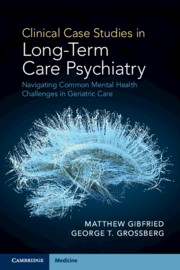 Clinical Case Studies in Long-Term Care Psychiatry
Clinical Case Studies in Long-Term Care Psychiatry Sexuality in Long-Term Care
Published online by Cambridge University Press: 31 October 2024
A significant percentage of older adults remain sexually active. Studies have shown that sexual activity in older adults is associated with better cognitive and mental health and better sleep. Major neurocognitive disorders are a common cause of sexually inappropriate behavior. Despite the few studies discussing sexual aspects in MNCD, existing reports indicate that up to 25% of patients suffering from Alzheimer’s disease have inappropriate sexual behavior, including increased sexual urge and hypersexuality. The ability of patients to consent to sexual relations may be underestimated by healthcare staff. Therefore, the issue of consent is an important point of discussion among staff members and each case should be assessed separately. Long-term care facilities should have policies in place that address the evaluation of a patient’s capacity to consent to sexual activity.
To save this book to your Kindle, first ensure no-reply@cambridge.org is added to your Approved Personal Document E-mail List under your Personal Document Settings on the Manage Your Content and Devices page of your Amazon account. Then enter the ‘name’ part of your Kindle email address below. Find out more about saving to your Kindle.
Note you can select to save to either the @free.kindle.com or @kindle.com variations. ‘@free.kindle.com’ emails are free but can only be saved to your device when it is connected to wi-fi. ‘@kindle.com’ emails can be delivered even when you are not connected to wi-fi, but note that service fees apply.
Find out more about the Kindle Personal Document Service.
To save content items to your account, please confirm that you agree to abide by our usage policies. If this is the first time you use this feature, you will be asked to authorise Cambridge Core to connect with your account. Find out more about saving content to Dropbox.
To save content items to your account, please confirm that you agree to abide by our usage policies. If this is the first time you use this feature, you will be asked to authorise Cambridge Core to connect with your account. Find out more about saving content to Google Drive.